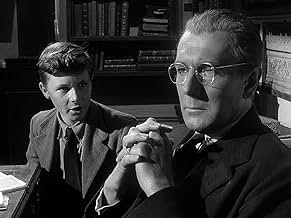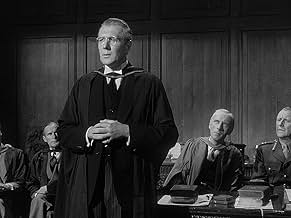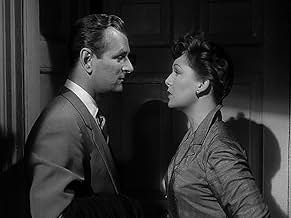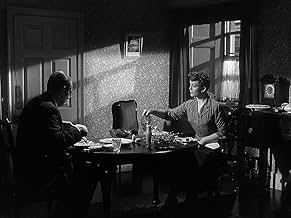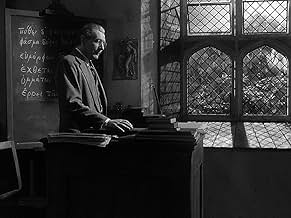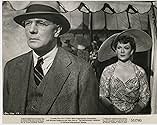Obligado a retirarse de una escuela pública inglesa, un profesor impopular debe enfrentar su fracaso como maestro y esposo.Obligado a retirarse de una escuela pública inglesa, un profesor impopular debe enfrentar su fracaso como maestro y esposo.Obligado a retirarse de una escuela pública inglesa, un profesor impopular debe enfrentar su fracaso como maestro y esposo.
- Nominada a2premios BAFTA
- 7 premios ganados y 3 nominaciones en total
- Dr. Frobisher
- (as Wilfrid Hyde White)
- Rev. Williamson
- (as Scott Harold)
- Laughton
- (sin créditos)
- Boy in Upper 5th Science Class
- (sin créditos)
- Mrs. Saunders
- (sin créditos)
- Gilbert's Senior Boy
- (sin créditos)
Opiniones destacadas
'The Browning Version' is a defining example of Rattigan at his finest. As said in previous reviews for the adaptations part of the Terence Rattigan DVD collection, is also at his best when laying bare deep emotional and psychological strains in his principal characters within a skillful dramatic framework. 'The Browning Version' epitomises that as well as everything that makes me love Rattigan's work so much. Was bowled over by this near-perfect 1951 film.
Not only is it the definitive version of the play but to me it is also one of the best adaptations of any of Rattigan's work, film or television. The only thing that rang false was despite Crocker Harris' very powerful, lump in the throat and tear welling departure speech how it concludes so optimistically after everything that happened in the rest of the film, it just seemed so contrived.
Can't say anything wrong with anything else though. The best things about it are the script and the performance of Michael Redgrave, the aspects that one remembers long after the film is over. The script benefits hugely from the involvement of Rattigan himself and from him extension, his superb writing, dynamic between the characters and consummate attention to very complex characterisation shine through wonderfully here and really keeps things afloat.
Redgrave is simply mesmerising, he has never been better and his performance is nuanced, at times stern and cold but extremely moving, there is self-pity here but done with incredible dignity. He's not the only good actor. Jean Kent's heartlessness as Millie is very chilling, if she comes across as a character with no redeeming qualities or weaknesses that is the film taking the right approach with a character that is meant to be like that. Nigel Patrick is suitably cocky, while Wilfred Hyde White steals scenes and Brian Smith is a winning Taplow.
Anthony Asquith's direction never allows the action to become stage bound. The gentile shabbiness of the school is captured neatly but never pat as is how all the different woes come over so mercilessly, which is what makes the drama so poignant and haunting. The story is basically an introspective character study and in terms of detail and emotional impact it's remarkably rich and subtle. There are standout moments such as the emotional turning point for Crocker Harris and the departure speech.
Cinematography is beautifully done and the set and costumes are handsomely produced. Good music from Arnold Bax as well.
In summation, a wonderful film and an example for any future Rattigan adaptation, especially for a play as good as 'The Browning Version'. 9/10 Bethany Cox
On the face of it, the subject matter and material are rather thin. Crocker-Harris, a stuffed shirt of a schoolmaster, is about to be retired due to ill-health, and replaced by a modern new blood who sees teaching as an extension of psychology. Mrs Crocker-Harris is a frightful snob and an unhappy wife who is playing away from home, and the schoolboys only have eyes and minds for a cricket-playing hero about to leave to join England's team.
You may feel all this would be predictable and more than a little dull, and perhaps without a strong actor such as Redgrave in the central role, it may well be. I have seen the stage play, with Edward Fox as Crocker-Harris, and found it a great performance and a wonderful period piece.
Here, Redgrave is a real tour-de-force, and his supporting cast, including Wilfred Hyde White as the headmaster, and Jean Kent as the battling Mrs Crocker-Harris, are well cast. There are several charming scenes between Crocker-Harris and his replacement (Ronald Howard), and between the older schoolmaster and pupil Taplow (Brian White).
And the Browning Version? A translation of Agamemnon which reminds Crocker-Harris of a time he was a young and enthusiastic teacher, ready to mould the young.
This film is a worthy companion to the earlier classic 'Goodbye, Mr Chips', and, I think, is just as good.
For illustrating how the elimination of human feelings can be so destructive to mind, body and soul, here Redgrave deserves all accolades awarded him. Clearly one of the finest actors in cinematic history.
Just to add here that it is not a weakness to illustrate feelings but as the film states strongly, it is more of a failure to hide them.
This is a lesson in how the human condition can in the end and ultimately triumph over suppression of life itself.
Excellent film.
Of course Michael Redgrave steals the show ,but he gets good support all along the way.His performance is subdued,but emotionally intense ,and if you do not shed a tear during his final speech,you must have a heart of stone.The black and white cinematography and the stifling atmosphere give the tragedy the three unities (place,time and action) and an inventive directing makes us forget it's a play,like in the best Mankiewicz works.
This is a wonderful film--and an interesting contrast to the old character from "Goodbye, Mr. Chips". While Chips was a bit stuffy, he adored his students and was beloved...whereas, with the character from this film Redgrave plays a man who is bitter and sad...yet by the end manages to keep some level of self-respect.
By the way, my wife hated that this film never really got to the heart of why the teacher and his wife were so cold towards each other. There is a scene that alludes, mildly, to perhaps him being impotent or perhaps even gay--but she needed to know this in order to love the film and was disappointed it was never revealed. See the IMDb trivia for more on this, by the way.
¿Sabías que…?
- TriviaTerence Rattigan's original one-act play ended with Crocker-Harris telling the headmaster that he wished to speak last at the closing ceremony. His apologetic speech to the students was written by Rattigan especially for the screen.
- Citas
Andrew Crocker-Harris: You see, my dear Hunter, she is really quite as much to be pitied as I am. We are both of us interesting subjects for your microscope, hmmm! Oh, both of us needing something from the other to make life supportable for us... and neither of us able to give it. Two kinds of love, hers and mine. Worlds apart! Oh, I know now, but back when I married her, I did not think that they were incompatible, nor, I suppose, did she.
- ConexionesReferenced in Wipeout: Episode #6.1 (1998)
Selecciones populares
- How long is The Browning Version?Con tecnología de Alexa
Detalles
- Tiempo de ejecución1 hora 30 minutos
- Color
- Relación de aspecto
- 1.37 : 1
Contribuir a esta página


